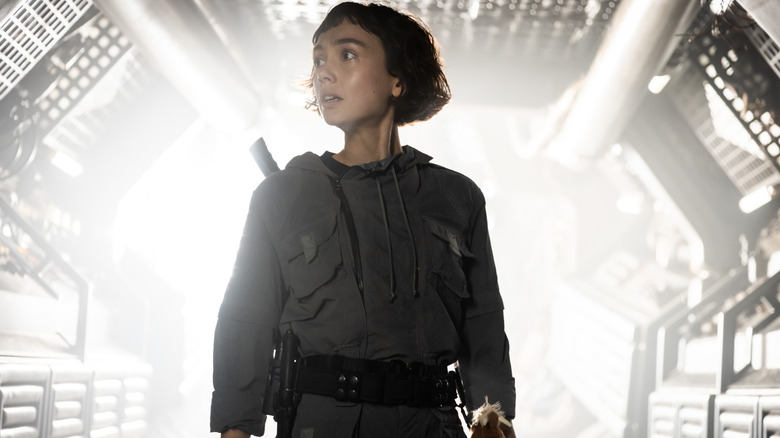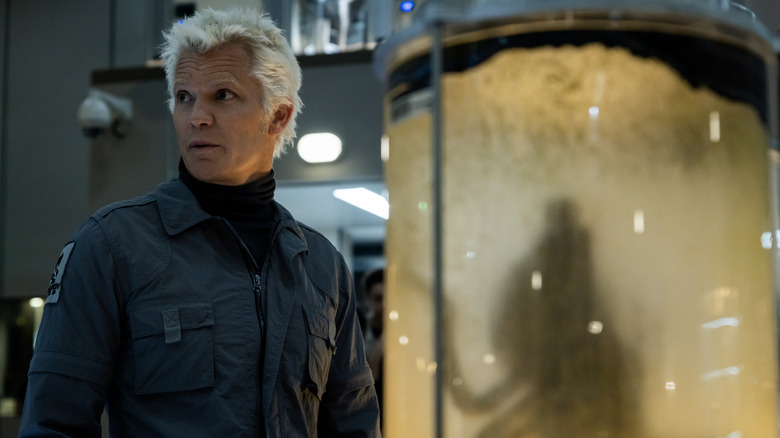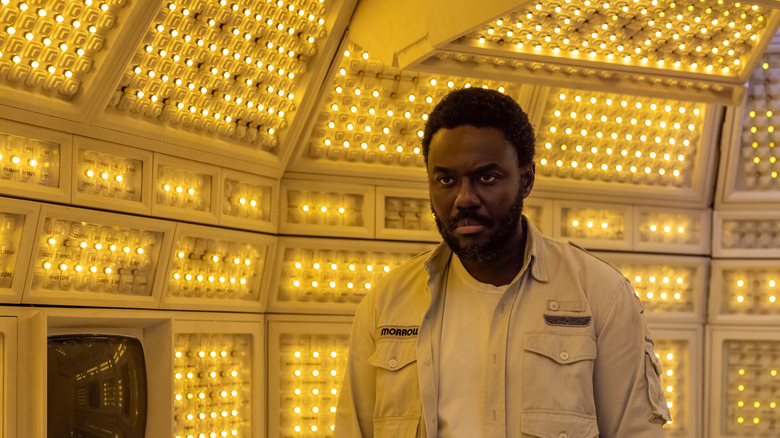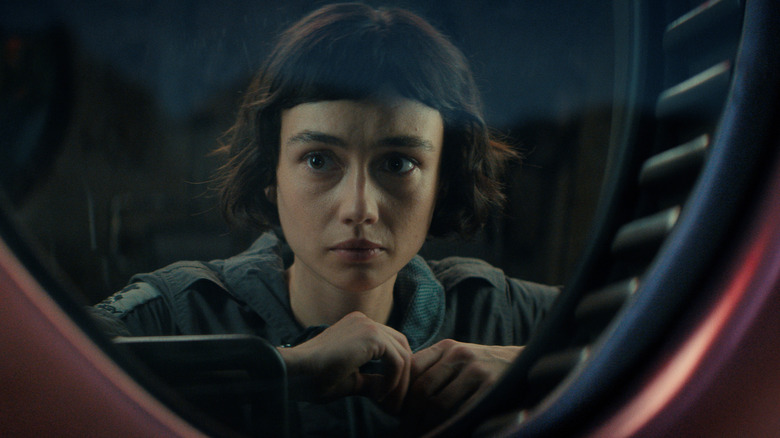Alien: Earth Review: Impressive Production Design Isn't Enough To Save This Sci-Fi Slog
For years, I firmly believed that there were no bad "Alien" movies (I am, of course, excluding the dreadful "Alien vs. Predator" films, which simply don't count). Ridley Scott's original "Alien" is a sci-fi horror masterpiece, the blueprint of so many films that followed. James Cameron's "Aliens" is a propulsive mash-up of horror, sci-fi, and brilliant action. David Fincher's "Alien 3" suffered from production woes but still manages to be a bleak, fascinating film. Jean-Pierre Jeunet's "Alien Resurrection" often gets a bad wrap but I find it stylish, weird, and enjoyable. Then you have Scott's two prequel films, "Prometheus" and "Alien: Covenant." These also don't have the best reputation, but I maintain that they're both excellent — especially "Covenant," which has a killer gothic horror vibe.
The thing that made all of these films worthwhile was how different they were. No two "Alien" movies were the same — even "Prometheus" and "Covenant," which tell a continuing story and feature the same director, feel vastly different from each other. Hollywood is full of franchises that try to do the same thing over and over again, and yet the "Alien" series kept trying to find new ways to keep things fresh. Then all of that changed with Fede Álvarez's 2024 "Alien: Romulus." That film was a box office hit and garnered praise among some fans, but it left me cold. To be fair, "Romulus" isn't really a bad movie — but it has nothing new to offer. Like so many modern reboots and revivals, "Romulus" wasn't interested in introducing new ideas, it simply wanted to reference a bunch of stuff that happened in previous films. There are numerous scenes in the film where characters repeat lines uttered in other "Alien" films, as if they were quoting movies they saw.
Now here comes Noah Hawley's "Alien: Earth," the first "Alien" franchise TV series, boasting impressive production design and not much else. Like "Romulus," "Alien: Earth" seems hellbent on referencing stuff that happened in the films. The opening scene of the show alone more or less recreates the opening of Scott's first film shot for shot, with underwhelming results. I've seen the first six episodes of "Alien: Earth," and while I'll fully admit the show looks great (and expensive!), it also ends up feeling like a lifeless slog that's a chore to sit through. Maybe it's time to put the "Alien" series back in hypersleep for a few decades.
Alien: Earth introduces robots with human consciousness ... with annoying results
Set two years before the first "Alien" film, "Alien: Earth" gets one key detail right: it understands that while the monstrous Xenomorphs are scary, the real villain of any "Alien" story is capitalism. In the future the show exists in, governments no longer exist — they've all been replaced by greedy companies. As "Alien: Earth" begins, a ship owned by franchise mainstay Weyland-Yutani is returning home to Earth after a 65-year mission to bring back a menagerie of alien species, including — you guessed it — those pesky Xenomorphs.
As is usually the case with an "Alien" story, something goes wrong and the ship crashes on Earth. The crash catches the attention of the extremely annoying Boy Kavalier (Samuel Blenkin), the young CEO of the Prodigy Corporation, a new-ish company that is about to make a major scientific breakthrough: hybrids, robots that have uploaded human consciousness. Prodigy already has a gaggle of test subjects: a group of sick and dying kids who have had their minds transferred into adult humanoid bodies. The leader of this pack (all of whom have adopted names of characters from "Peter Pan") is Wendy (Sydney Chandler), who fronts a rescue mission to investigate the crash site.
Immediately, "Alien: Earth" is on shaky ground. While I'm sure someone, somewhere, thought the whole "kid brains in adult bodies" idea could be fun, it gets real old, real fast. Watching a group of adult actors behave like children comes across as frustraing and distracting, and while I wouldn't say the performers are doing a bad job (Chandler in particular has a real star quality), I found the characters grating. To be fair, "Alien" has always been a bit of a misanthropic franchise, where the humans (or humanoids) are prone to making bad decisions, but that doesn't mean I want to watch an entire show about that.
Alien: Earth spends a lot of time referencing moments from the original Alien
To counterbalance the childish adults, "Alien: Earth" also throws in a character like Kirsh, a robot (or synth, as they're called) played by Timothy Olyphant. Olyphant is one of those always-dependable, always-reliable performers, but in the first six episodes, he has very little to do. We get multiple scenes where he silently observes stuff via TV monitors and keeps what he learns a secret. I'm sure it's building to something, but I'm not sure I'm very interested. The only other character to make much of an impact is Morrow (Babou Ceesay), a morally gray cyborg willing to do what it takes to maintain those alien specimens. Ceesay brings a real tragic menace to his character, and I wanted more of him and less of nearly everyone else.
Hawley and his team attempt to expand the overall mythology of the series by introducing some new alien species in addition to the famous Xenomorphs, and while the new creatures are appropriately gross and slimy (seriously, the slime budget for this show must be through the roof), none of the new monsters can stack up against H.R. Giger's iconic creation.
Not helping matters is the fact that "Alien: Earth," like "Romulus," seems so damn committed to reminding us of things from previous movies in ways that feel lifeless and uninspired. "Remember how everyone had '70s haircuts in 'Alien'? What if we gave the crew of this ship those same haircuts?" It gets tiresome.
Alien: Earth ends up being surprisingly boring
Perhaps "Alien: Earth" would fare better if it was a new, original sci-fi story that had nothing to do with the "Alien" franchise. As the episodes unfold, the series seems almost reluctant to give us much Xenomorph material, instead choosing to focus on literally everything and anything else. Every now and then, a Xenomorph will pop up to remind us that, yep, this is an "Alien" show, but it feels almost arbitrary.
Ultimately, the greatest sin "Alien: Earth" commits is that it ends up being boring. No matter what flaws some of the "Alien" sequels have, I don't think anyone could ever accuse them of being "boring." Even "Romulus," a film I didn't really love, kept things mostly interesting. "Alien: Earth," in sharp contrast, has strange pacing and overcooked editing that ends up being distracting. To be fair, this is a series meant to be watched on a weekly basis rather than binged all at once, but the energy here is so flat that I imagine viewers might get fed up and abandon ship early rather than sticking with the entire mission.
/Film Rating: 5 out of 10
"Alien: Earth" arrives on FX and Hulu August 12, 2025.



